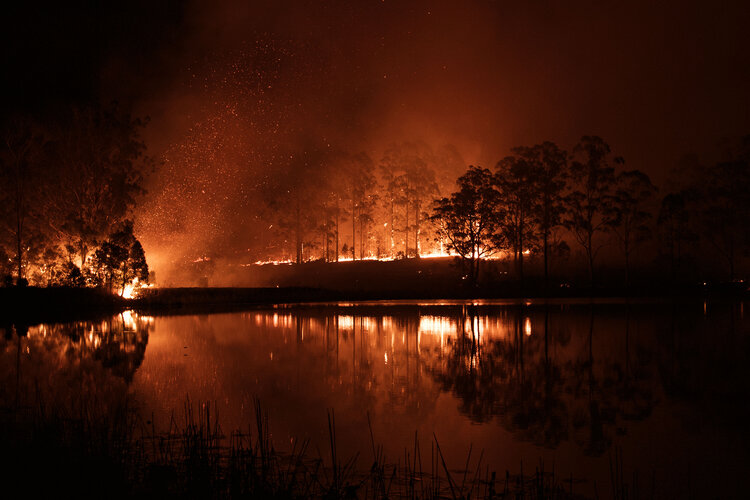Stephen Dupont
Conflict, documentary, environmental filmmaker & photographer
Hi Stephen, tell us about yourself
I’m Stephen Dupont, an Australian artist and I work with photography, video and print.
Working in the field of documentary, I enjoy selected magazine assignments, but I am mostly committed to long term personal projects. I move within the editorial, art and film worlds. Born in Sydney in 1967, I grew up in the western suburbs and Southern Highlands under tough social conditions and displacement, with social worker parents, who were full-time carer's of state wards.
I am recognized around the world for my concerned photography on the human condition, war and climate, earning dozens of prizes including the W. Eugene Smith Grant, Robert Gardner Fellowship from Harvard University, a Robert Capa Gold Medal Citation, the Olivier Rebbot and several World Press Photo Awards. I hold a Masters degree in Philosophy and enjoy teaching workshops and giving public talks around photography, film and my life. Dozens of books and catalogues on my photography and diaries have been published, (Steidl, NYPL, Radius, PowerHouse, Yale & Aperture).
I am a self taught photographer and my teachers were the documentary photographers that inspired me, like Don McCullin, Josef Koudelka, Robert Frank, James Nactwey and W. Eugene Smith. By immersing myself in their books I saw a kind of vision and style that I would take on board, emulate and then refine into my own style of photography, which is a photo journalistic and documentary approach. Film makers like Stanley Kubrick and Terence Malik, many writers like Hemingway and Steinbeck and artists like Goya and Bacon all contributed to my development as a photographer and artist. I got into photography through early travels as a late teen into remote and wild places, using photography as a kind of diary. When I visited the Magnum Agency exhibition In Our Time and saw the power of the photography, especially that of Salgado, I knew I had to become a documentary photographer.
What's in your camera bag?
Film, digital or both?
I carry both film and Digital gear. It will vary depending on my projects and whether I am shooting video or not. But my main kit would consist of a Leica Digital and film rangefinder body, 35, 50 lenses are my mains. I will also have medium format film cameras like a twin lens reflex Rolleiflex or a Mamiya rangefinder 6 and a 7. I use a Hassleblad panoramic Xpan camera as well. I often use Polaroid as well and will have an SX-70 and a large format 4x5 land camera. Then there is film, memory cards and readers. Also a torch and medical kit and Leica 28mm lens and two extra Leica film bodies along with a Minolta lightmeter.
I try and also travel with a zoom recorder for audio. I always have a silk cloth to clean the gear, batteries, small pocket tripod and leatherman multi tool.
What's your most memorable photo?
This an almost impossible question to answer. It would be a photograph I never took, one that I saw but missed because I didn’t have a camera on me…or one that I will take down the road at a later date I hope.
Of all the photographs I have taken it would be probably one I took in Afghanistan, one of my favorites is of a man in Kabul, one of many I photographed that day along a dusty and busy bus station. My good friend and colleague Jacques Menasche and I had spent weeks doing a story around heroin addiction and I think the feeling of seeing something with a sense of normality felt liberating. It was the first time I had made large format portraits like this in Afghanistan and the surprise element that evolved that afternoon inside that chaotic scene was truly astonishing. The initial controls I put on the subject and the crowds to stay away collapsed and led beautifully to the scenes of the audience that don’t know they are in the frame being captured along with the direct gaze and attention of the sitter. The surprise and mystery off each frame was priceless, and on top of that I was able to gift every subject a Polaroid.
Somehow the man’s solemn look and the various emotions from the crowd makes the photograph simultaneously timeless and present. Maybe he’s the face of all Afghans: proud, strong and confident — but worried.
What does your next photography adventure look like?
Well, I have pretty well had my freedom taken away from me for the past 2 years because of COVID and Australia’s strict dealings of it. So I am waiting withheld breath to go and travel and shoot new work. I will be continuing to work in Australia around the climate crisis in the short term, then I hope to go back to the USA and begin a major long term project collaboration with my writer friend Jacques Menasche that will look at America today.
How has photography evolved since you’ve started shooting?
I learnt with analogue and shot film and printed in the darkroom when I started out and I have seen the evolution of digital that has now become the staple means for most photographers. Strangely, I have kept shooting with film as my preferred medium when it comes to BW and shoot digital for my colour work as the technology has become so good that it is hard to go by the advantages of digital new with low light and quality of resolution. I have always benefited from the digital production of image files that I can layout in my book designs and also print from.
Where will we find you when you’re not taking photos?
I guess I am mainly with my family, my partner and daughter. My main physical activity is surfing which also acts as a great mind healer as well. I spend a lot of time editing through my archive or new works and designing new book and exhibition projects. I do lots of research mainly through reading books and watching films. Music is also big with me, I play vinyl as I am working in my studio, it gives me ideas and enjoyment.
What advice have you got for the younger you, just starting out on your photography adventures?
My greatest advice was to always listen, watch and learn from everyone and everything that life throws at you. Be open to information and knowledge around you and be egoless. Youth has the tendency to bring out the arrogance of people and it becomes a negative time and emotional barrier. Respect and learn from the wise in every way.
Stephen's work












Thanks to Stephen for his generous time and input into creating this article. Stephen's images are reproduced with permission.
To discover more about Stephen and his stunning work be sure to visit his website and follow him on Instagram:

